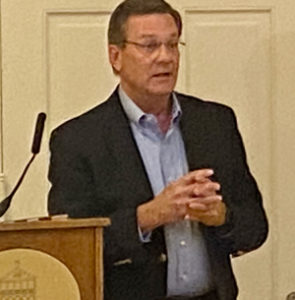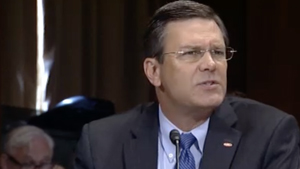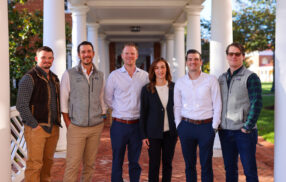
“Immediately Upon Marriage, We Started Planning the Divorce.” Rapid Change Shapes Former Corteva CEO’s Approach to Leadership Communications.
By Tom van der Voort

Jim Collins addressing the Darden Leadership Communications Council at UVA’s Colonnade Club
As a 30-year DuPont veteran, Jim Collins played a key role in the company’s 2017 union with Dow Chemical, leading antitrust reviews, integration design, investor roadshows, and employee communications for the transaction. But a high-pressure, public-facing role in the large and complicated merger was just the beginning, Collins told members of the Darden Leadership Communication Council at their 2022 meeting in mid-October.
In addition to Collins’ keynote, the gathering included a full day of sessions on Darden Grounds, with communication leaders from companies such as McDonald’s, The Coca-Cola Co., Microsoft and Hilton, among others, addressing topics such as crisis communication, leadership integrity in a time of disruption and employee engagement.
The goal of the DowDuPont merger was in fact a split, Collins told the Council: Three separate market-leading companies would emerge in a process described as “a huge and highly complex transaction that transformed the chemical industry landscape.” When the dust had settled, Collins found himself at the head of Corteva Agriscience, a global seed and crop protection company with 21,000 employees. Months after ringing in the new company’s place on the New York Stock Exchange, the COVID-19 pandemic hit.
Creating a new corporate culture from three separate entities (DuPont, Dow, and DuPont’s Pioneer Company) in an era of social upheaval and tremendous business pressure was a unique challenge. Surmounting it left Collins with four lessons in corporate communications to pass on.

Jim Collins in front of the Senate Judiciary Committee, 20 September 2016
Be Prepared
There is no substitute, Collins said, for mastering the material you are trying to communicate and practicing delivering it. “There is no more intimidating venue in the world,” Collins said of testifying in front of the Senate Judiciary Committee. “Anything that I said that came out of my mouth at that time could have caused [one of] the largest mergers [in history] to fail.” Preparation not only reduced the chance of a misstep, it added to the confidence and comfort Collins had in delivering his message, especially when the lights were brightest.
Be Simple
When he took over Corteva, an instant Fortune 200 company, Collins new company entered the worst agriculture market in recorded history. On top of the business downturn, he had 21,000 employees whose work and personal lives were thrown into turmoil by a worldwide pandemic and massive social unrest.
Collins had to run Corteva from his kitchen table, and with so many potential distractions, he identified five key themes and focused on them every week in videos he shot himself from his kitchen table. The simple format and consistent content led employees to feel connected with the company, the mission, and Collins himself. Not only did his team find business success, “we found a work/life balance. We found a new spirit. . . . We lived through something together for the first time [as a company].”
Be Relevant
Collins was very aware that his perspective on the company was unique. His board was older, and his employees were young and diverse. He needed to make sure he crafted messages that resonated with all his stakeholders, so he surrounded himself with people who could look at things through a different lens. “How does a single parent feel? How does a new hire feel?” And he tested messages for his board with individual members to get their feedback. “Those confidential confidants really helped me.”
MORE: Evaluating “The Statement of a Purpose of a Corporation”
Be Sincere
As a perfectionist, Collins strove to make all his messages perfect but came to realize that a loss of sincerity was the cost. Sincerity provides a useful counterweight to preparedness. The key was preparing enough to be comfortable, but not so much as to be scripted. Without the teleprompter and other tools he had grown used to using, Collins added a layer of spontaneity and authenticity to his communications at a critical time.
Before Collins left the company, he had several successes to brag about.
- “The team over a three-year period delivered a 100 percent improvement in total shareholder value.”
- “We added a billion dollars in brand new earnings in two-and-a-half years.”
- “The first new trait [a genetic characteristic bred into seeds] for farmers in over twenty years”
- “The company doubled its market cap from 20 to 40 billion dollars.”
“I truly believe that communications made all the difference here.”
The University of Virginia Darden School of Business prepares responsible global leaders through unparalleled transformational learning experiences. Darden’s graduate degree programs (MBA, MSBA and Ph.D.) and Executive Education & Lifelong Learning programs offered by the Darden School Foundation set the stage for a lifetime of career advancement and impact. Darden’s top-ranked faculty, renowned for teaching excellence, inspires and shapes modern business leadership worldwide through research, thought leadership and business publishing. Darden has Grounds in Charlottesville, Virginia, and the Washington, D.C., area and a global community that includes 18,000 alumni in 90 countries. Darden was established in 1955 at the University of Virginia, a top public university founded by Thomas Jefferson in 1819 in Charlottesville, Virginia.
Press Contact
Molly Mitchell
Senior Associate Director, Editorial and Media Relations
Darden School of Business
University of Virginia
MitchellM@darden.virginia.edu





